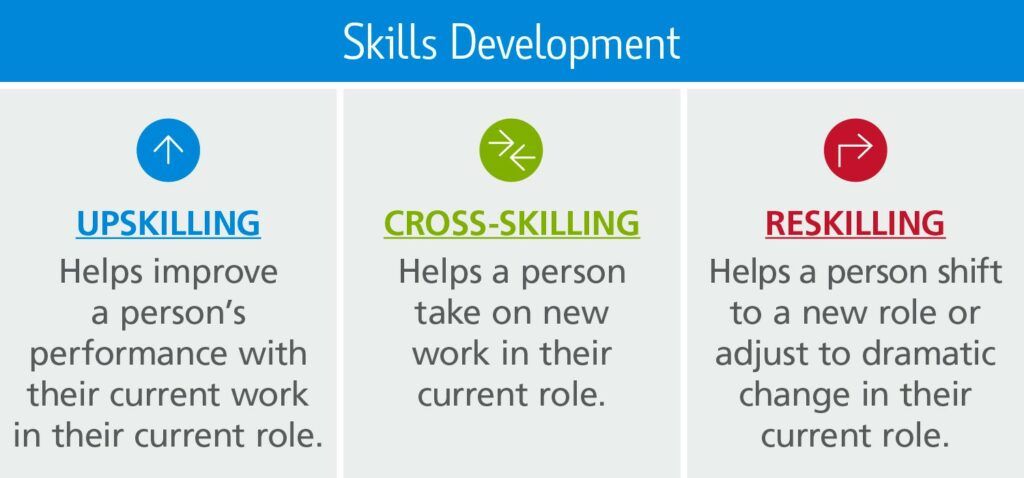
Orginally Written by Karan Shah
Updated on Dec 11, 2025
Share on:
Cross-skilling involves learning new skills outside your primary area of expertise to enhance versatility in the workplace. Programmes like IIDE’s digital marketing courses help professionals diversify their skill sets. The global demand for multi-skilled workers is expected to grow by 20% annually, making cross-skilling a valuable investment for career growth and job security.
A lot has changed in the past decade regarding the skills that get you the dream job. While the early 2000s saw degrees as criteria, from 2010 onwards, digital and cross-skilling were given significant importance.
Today, employee development skills and the number of skills affect the hiring process. This is where cross-skilling comes into the picture! Confused? In this blog, we discuss, in detail, the concept of cross-skilling meaning and why both corporates and employees need cross-skilling in 2026!


Learn Digital Marketing for FREE


What is Cross Skilling?
Cross-skilling is defined as onboarding or training employees in multiple skills. In layperson’s terms, an employee is trained to work in roles outside of his current position. Cross-skilling benefits both the employee and employer, and we have discussed the importance for both parties below.
Employee development is crucial in this process, as it helps employees enhance their capabilities and adaptability, leading to increased productivity and satisfaction.
When discussing cross-skilling, we must examine the Indian working environment. India is a developing country, so we are working towards improving our tertiary sector – the service sector
Companies in the service sector often face a higher attrition rate owing to various factors such as stress, lower bandwidth of resources, unsatisfied employees, etc. Hence, cross-skilling benefits Indian companies. However, very little awareness about employee development exists in Indian companies and MNCs
In the last few months, top corporate training companies such as IIDEPro have updated their corporate training programmes to consider their clients’ need for cross-skilling, especially in digital skills. Let’s now know what Digital Cross Skilling is.
Digital Cross Skilling
If you are a job seeker or actively onboarding or training existing employees, you must know about 2026’s top hiring trend – Digital cross-skilling! Since emails, corporate environments have ensured employees are updated with the latest technologies. Today and ten years from now, technology will rapidly grow. Consequently, it is essential that you are well-adjusted to digitisation in your workspace, irrespective of your job profile. This particular phenomenon is known as Digital Cross-Skilling.
It improves employee productivity, focus, and ease of doing tasks. On the other hand, for companies, well-versed employees in their job profile and digitisation contribute much more than just their daily tasks, resulting in more business, customer satisfaction, etc.
Let’s read about the difference between cross-skilling, upskilling, and reskilling, as all three concepts have a significant distinction and offer different benefits.
Cross Skilling vs Upskilling vs Reskilling

(Source: ITA)
The terms Cross Skilling, Upskilling, and Reskilling are misunderstood as similar when actually they are vastly different.
-
Cross-Skilling
When corporates or employees choose to be trained in a skill other than their primary skill, it is known as cross-skilling. Cross-skilling benefits employees in their annual appraisals and helps corporations cut hiring costs. For example, a graphic designer learns the basics of digital marketing to understand the target market’s intent and preferences.
-
Upskilling
When working professionals choose to stay constantly updated and learn more about their primary skill, it is known as upskilling. For example, a marketing associate does a PG in Digital Marketing or enrols in various courses on digital marketing online to sharpen their skills and earn a higher salary.
-
Reskilling
When someone changes their primary skill to start a new career, reskilling is a long process taken up by those who want to change their profession. For example, someone with a finance career and 5+ years of experience quit their job and trains in digital marketing to start their digital marketing agency.
Now that we clearly distinguish between cross-skilling, Upskilling, and Reskilling, let’s understand why cross-skilling is slowly becoming a corporate favourite. This approach enhances employee productivity and aligns with employee development initiatives, making it a valuable strategy in modern workplaces.
Why should Corporate Opt for Cross Skilling?
Cross-skilling is a new concept; only some HR departments have adapted.
If you are responsible for employee development, cross-skilling is the need of the hour – It enhances employee productivity. It prepares your team for a future where flexibility and diverse skill sets are crucial.
Loving the insights in this article. Dive into these digital marketing blogs for more great reads!
1. Higher Productivity Collectively
Leading a team is challenging, but ensuring that the team grows together and is always on the same page is even more difficult. C
conducting cross-skilling sessions for an entire team or department always results in higher employee productivity, keeping employees collectively motivated. When cross-skilling sessions are curated with a particular company’s goals and strategies kept in mind, the team stays aligned and works hard to achieve those goals.
Watch how IIDEPro trained Mahindra’s sales team in digital skills. This is an excellent example of how the sales team at Mahindra will adopt digital skills in their current roles to perform better collectively.
2. Lower Hiring Costs
Imagine if you have a versatile employee who can not only do their job but also contribute towards an out-of-department task. Wouldn’t it save the HR Department’s time and cost?
As corporates, when you invest in employee development through cross-skilling sessions, you make them future-oriented and ready to perform tasks that were once out of their bandwidth. Let’s take an example of Company X’s HR Department.
The web developer of Company X suddenly resigned, and the HR Department was actively looking for a replacement. With a lack of resources in the market, they received very few resumes that fit into their profile.
However, the budget and salary expectations of the interviewees needed to be met. Due to this, urgent tasks for their website remained untouched.
Now, if Company X had held annual cross-skilling sessions about various topics, they would have a few employees who would know how to handle the website, and urgent tasks could be performed. Hence, cross-skilling lowers hiring costs and saves time by improving employee productivity.
3. Lower Attrition Rate
An attrition or churn rate is the rate at which employees leave the company.
After the lockdown in 2020, the average attrition rate in India has increased from 6% to 20.3% in 2022 (according to Livemint). This rapid growth of attrition rate only signifies that employees are leaving their jobs or being laid off more than ever.
While cost-cutting after the lockdown might be a reason for such a high attrition rate, low job satisfaction, monotonous work, and poor learning opportunities have weighed much higher.
Cross-skilling is the correct opportunity for corporations to lower their attrition rate and safeguard unique talent who otherwise could leave the company due to monotonous work and fewer development goals for work opportunities.
4. Good Change for Employees
Apart from annual appraisals and perks, corporates must keep employees emotionally and mentally satisfied in their workspace.
In India, where only 1 in 5 employable people are skilled, companies must try their best to offer an environment where they feel cared for. Hence, the Learning and Development or HR department must hold regular cross-skilling sessions on different topics so employees know how various other departments operate.
This allows them to look beyond their cubicle and gain fresh perspectives. Such a change motivates them to work unitedly towards the company’s goals and enhances employee productivity.
To truly grasp the corporate world, it’s essential to understand how companies function internally. Are they part of the music industry, like Spotify, or do they belong to a different sector, such as a sports brand like Nike? Each industry operates differently, but one shared priority is keeping employees safe and satisfied.
For instance, look at the business model of Spotify and the marketing strategies of Nike to see how they conduct their business while keeping employee well-being at the forefront.
If you’re curious about other brands, these digital marketing case studies should be your next must-read of the season
5. Adapting to Latest Technology and Work Trends
Work trends are changing in 2026, and you no longer need to write a long email to reach your upper management.
Flexible modes of communication have enabled the discussion of strategies across multiple departments in one company. Cross-skilling benefits help corporations keep all employees (irrespective of their department) updated on the latest technology used by various departments.
For example, a cross-skilling session on data analytics will help graphic designers understand how to read the target audience and create graphics that suit their demographics and preferences.
Now that we know why corporations should consider cross-skilling as the need of the hour, let’s see why it is essential for employees to be skilled outside their job profile for their professional growth.
Speaking of technology, if you’re looking to cross-skill in a rapidly growing field, we’ve got just the thing for you. AI is taking over the world and becoming essential for everyone on a daily basis. If you still need to hop on the bandwagon, now’s the time! Still, trying to figure out where to start? Begin with a free ChatGPT course. It’s the perfect introduction.
But if tech isn’t your thing and you’d instead explore the world of marketing while finding what you love (and earning some serious cash), we highly recommend this free top-paying skills course. It’s a game-changer!
Why Should Employees Opt for Cross-Skilling?
Even if corporates hold regular cross-skilling sessions, many employees need help to step out of their comfort zone and be multi-skilled. Here are five reasons why employees should take cross-skilling seriously for their professional growth and to achieve development goals for work.
1. Fruitful for Appraisal Season
Appraisal season is here, and everyone’s eyes are on that salary increase. While compensation is necessary, demonstrating your value beyond your core role can significantly boost your chances. Here, cross-skilling benefits you by allowing you to position yourself as a versatile asset to the company. This proactive approach impresses managers and opens doors to new opportunities and career growth.
2. Break the Monotony
According to a 2020 research, monotonous work, however creative, leads to stress, affects mental health, and hence leads to burnout.
In your lowest professional moments, because of tedious work, you might make decisions that affect you in the long run. You must create a positive distraction to save yourself from the burnout stage.
Here’s where cross-skilling benefits can help employees! You can distract yourself from your current work, learn about other skills, and brainstorm with other departments, thus reducing the chances of burnout.
3. Work Across Multiple Departments
Today’s workforce is a dynamic, ever-evolving landscape. Young professionals are eager learners, prioritising hands-on experience and continuous growth.
They thrive on opportunities to explore different roles and expand their skill sets. This desire for versatility has led to a surge in cross-skilling, benefitting employees by allowing them to contribute across various departments and drive innovation.
For example, if you are a content writer, you work closely with the SEO and Social Media departments. Knowing how both work will help boost employee productivity across multiple departments.
4. Creates an Impressive Resume for Future Purposes
Cross-skilling doesn’t just help employees in their current job roles. Those looking for a change in their professional life always seek professional growth opportunities in terms of salary offers and job expectations.
When your resume talks about your personality and capabilities instead of focusing on your primary skill, it creates an excellent first impression for those wanting to hire you.
This is also where Digital Cross Skilling is important. If your resume states that you are well-versed in the technology required in your field, you will find yourself in front of the race to acquire a particular job.
To learn how to create an impressive digital marketing resume, click here.
5. Can Help Earning in Side Income
Cross-skilling, meaning being trained outside your primary skill set, opens up opportunities for professional growth.
Many jobs, such as those in telecommunications or finance, often don’t require you to look beyond your cubicles. However, cross-skilling can help you earn a side income in such tight situations.
Many employees work 9-to-5 jobs during the day in various capacities and offer freelancing services after work hours in different industries. Hence, cross-skilling helps you earn a side income and contributes to your employee development, leading to potential salary hikes in your day job.
3 Methods of CrossSkilling Training in 2026
We have used cross-skilling multiple times in this blog, defined it, and stated its benefits for corporations and employees, particularly regarding employee development and professional growth. Now, the big question is, how do you cross-skill? Read on to find out!
1. Instructor-led Online Training
The first and most popular method of cross-skilling post-lockdown is instructor-led online training. Employees looking towards professional growth but have hectic work hours can choose this method as it aligns well with development skills for employees.
If you are looking to cross-skill in the digital marketing field, IIDE offers an industry-relevant digital marketing course. The Online Digital Marketing Course is flexible and designed to cater to students and working professionals.
While pursuing this digital marketing course, you not only master digital marketing skills but also work on multiple brands such as Nykaa, Loreal, Starbucks, and OYO Rooms as a part of the assignments. Hence, you will not just gain a skill other than your primary skill but also learn how to research various brands that might be your current competitors.
2. Instructor-led Offline Training
Another method of cross-skilling is Instructor-Led Offline Training. This method is prevalent among companies that want to conduct cross-skilling sessions for many employees simultaneously. In this case, a company’s Learning and Development department outsources the Cross Skilling task to corporate training companies.
Talking about corporate training companies, IIDEPro offers customised training in the digital space. Prestigious companies such as Cipla, Volkswagen, Godrej, and Pfizer have trusted IIDEPro to train their employees in various corporate training topics. This has helped them keep employees across multiple departments updated digitally and understand how they can all work together to achieve the company’s long-term goals.
This is what the team at Asian Paints has to say about IIDEPro’s Corporate Training Program –
3. Training at Work / On-the-Job Training
A rarer and more time-consuming cross-skilling method is learning it while you are at work. This method is considered less successful as it leads to faster burnout and may hinder professional growth. It cannot be expected that an employee will perform their regular tasks and learn about other departments in a limited time frame daily. In this method, the employee who wants to cross-skill and the employee/manager who trains need to be mutually agreed upon, aligning their efforts with development goals for work.
To Conclude
Cross-skilling is becoming increasingly popular as corporations understand its importance and hidden benefits. The lockdown has taught companies to be ready for any working environment.
In 2026, with outside factors such as fluctuating economic conditions and increased work opportunities, HR departments must offer professional growth opportunities to keep their unique talent interested and aligned with the company. Moreover, incorporating development skills for employees into regular training sessions can help organisations build a resilient workforce capable of adapting to various challenges.
Understanding the digital marketing landscape is crucial for businesses aiming to succeed in today’s competitive environment. Cross-skilling is essential, allowing employees to expand their knowledge beyond their primary roles and contribute more effectively to the company’s success. If you want to enhance your skill set, consider exploring digital marketing courses in navi mumbai or digital marketing courses in south delhi.
Alternatively, if you’re based in Noida, there are excellent digital marketing courses in noida to help you broaden your expertise right in your neighborhood.
In conclusion, cross-skilling is not just a trend but a strategic necessity in today’s fast-paced world. Companies can retain top talent and enhance employee productivity by fostering continuous learning and emphasising professional growth. This proactive approach ensures that employees remain engaged, motivated, and equipped with the necessary skills to drive the organisation forward, regardless of external circumstances.
Want to Know Why 2,50,000+ Students Trust Us?
Dive into the numbers that make us the #1 choice for career success

MBA - Level
Post Graduate in Digital Marketing & Strategy
Best For
Fresh Graduates
Mode of Learning
On Campus (Mumbai & Delhi)
Starts from
Mar 23, 2026
Duration
11 Months
Live & Online
Advanced Online Digital Marketing Course
Best For
Working Professionals
Mode of Learning
Online
Starts from
Mar 6, 2026
Duration
4-6 Months

Online
Professional Certification in AI Strategy
Best For
AI Enthusiasts
Mode of Learning
Online
Duration
5 Months

Offline
Undergraduate Program in Digital Business & Entrepreneurship
Best For
12th Passouts
Mode of Learning
On Campus (Mumbai)
Duration
3 Years
Recent Post
Digital Marketing Courses Nearby
You May Also Like
Cross-skilling is the process of acquiring training in a skill other than the primary skill. Cross-skilling benefits both corporates and individual employees by enhancing employee productivity and fostering a culture of continuous learning.
Cross-skilling enables professionals to work across departments while upskilling focuses on growth within their current role. Both require training in the latest technologies and trends to boost employee productivity and meet development goals. This approach ensures adaptability and maximises efficiency in the digital age.
Freshers should opt for cross-skilling to help them ask for a better appraisal, add weight to their resume, break the monotony of work, and work across multiple departments. This contributes to their professional growth and enhances employee productivity, making them valuable assets in any team.
Corporations should consider cross-skilling to keep their employees motivated, boost employee productivity, cut hiring costs, reduce attrition, and ensure that the company works with the latest technology and work trends, maximising cross-skilling benefits.
Like IIDEPro offers, instructor-led offline training suits executive and lower-level management best. Since they form a significant part of the workforce, training them offline keeps them motivated aligned with company goals, and enhances productivity, ensuring they remain engaged and contribute effectively to long-term objectives.
Cross-skilling enhances employees’ versatility, allowing them to take on multiple roles, which boosts job security and career growth. For organisations, it leads to increased agility, reduces skill gaps, and ensures continuity during staff shortages or shifts in project demands.
Companies can implement cross-skilling by first identifying critical skills across departments, offering tailored training sessions, encouraging job rotations, and fostering a culture of continuous learning. Regular assessments and feedback ensure employees develop the right competencies for broader responsibilities.
Karan Shah is the Founder and CEO of IIDE – The Digital School, Asia’s premier digital marketing institute. With over ten years of hands-on experience in the digital marketing industry, Karan has played a pivotal role in empowering thousands of students to forge successful careers in this ever-evolving field.
His vast expertise encompasses various areas such as paid search, social media marketing, programmatic marketing, and much more. Karan's passion for education, teaching, and public speaking led him to establish IIDE, where he offers world-class digital marketing education designed to meet industry standards.
To date, he has trained over 60,000 students and worked with more than 25 corporates, sharing his knowledge through both online and offline platforms. A Harvard Business School alumnus with a specialisation in E-commerce, Karan is also an accomplished Tedx speaker. His industry insights and teaching excellence have earned him a prestigious role as a visiting faculty member at India’s top management institutes, including the Indian Institutes of Management (IIMs).